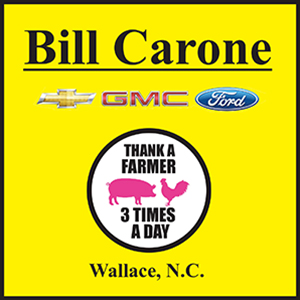During the month of July, seven of the planned 12 all-way stops throughout Duplin County were installed by the North Carolina Department of Transportation (DOT).
The most recent all-way stops are at the intersections of NC Highway 11 and Bay Road, NC Highway 11 at Register’s Crossroads (Register Road and Stocking Head Road), and Charity Road and Bay Road. Earlier in July, all-way stops were put into place at the following intersections: Tram Road at Bethel Church Road, Tram Road at Bennetts Bridge Road/Scotts Store Road, Tram Road at Red Hill Road, and Bowdens Road at Revelle Road.
Those still to be determined include: NC Highway 41/NC Highway 111 at Jackson Store Road, NC Highway 50/NC Highway 403 at Warren Road, Warren Road at Solomon Street, Liddell Road at Drummersville Road, and NC Highway 403 at Beautancus Road.
Many motorists are wondering why the stops are needed. To answer that, NC DOT Communications Officer Lauren Haviland told Duplin Journal, “After studies were conducted at these intersections, NC DOT determined an all-way stop would be a cost-effective way to improve safety.”
According to NC DOT’s website, converting intersections into all-way stops has been shown to reduce fatalities and injuries by 77%. “The N.C. Department of Transportation recommends an all-way stop only after a thorough evaluation of the intersection,” the website goes on to say. “That evaluation includes an analysis of the traffic volumes, crash history, sight distance and a field investigation.”
There are no public hearings or approvals sought from county commissioners or other local government entities before these projects are scheduled and completed. The DOT does send out press releases with dates when the all-way stops will be added, but that, along with signs at the affected intersections, is really the only public communication that DOT carries out.
Though county commissioners have no part in bringing the all-way stops to the county, the commissioners discussed the stops at their February meeting, in hopes of informing the public of what was to come.
Commission Chair Dexter Edwards stated at that meeting that he wasn’t sure the all-way stops were necessary. “There may be information that the state has from accidents and such that I’m not aware of,” said Edwards. “I’m old school, but when I’ve rode down a road as many years as I have, all of a sudden I come under a four-way stop on it, I’m aggravated and, like I said, if it is preventing accidents, I’m not trying to argue with the data, but I don’t see the value myself today.”
At that same meeting, Commissioner Wayne Branch stated that he had received many calls when an all-way stop was installed last year at the intersection of Bay Road and US Highway 117. “So, I went out there and actually sat there a little bit and watched a lot of tires sliding as a result of not being aware,” he said. “So, I contacted the DOT just to try to get an understanding as to why you would put a stop sign on a 55-mile-an-hour zone.”
In an interview with Duplin Journal, Branch said he learned from that experience that sometimes, all-way stops are necessary, even though it may be an inconvenience or a shock to motorists who are used to sailing straight through at 55 mph.
“I, from my perspective, especially with the one at Bay Road and 117, I felt that there was a strong effort by the DOT to make that road safer,” he said. “I reached out to DOT and they told me that a lot of research had gone into that decision and that there had been a lot of wrecks at that intersection.”
He said it was somewhat frustrating that the county commissioners are not part of the decision-making process, but it is their duty to try to make the public aware that the new stop signs are coming. “Especially in rural North Carolina,” he said, “making sure everyone knows it is coming is important. And I feel this time, we have been made more aware of what’s coming.”
As for the necessity of so many all-way stops coming to county roads, Branch said, “I wouldn’t say I agree, but then DOT are the subject matter experts. There have been a lot of questions as to why they’re needed, but again, they are the experts on this and have done the research.”
 Twitter
Twitter Facebook
Facebook Instagram
Instagram





